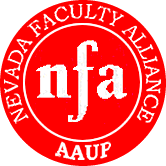The state budget for higher education is scheduled to close next Wednesday, May 18. It is critical that supporters of higher education in Nevada contact our key legislators, particularly those on the budget committees in the Assembly and Senate.
Call as many of them as you can, on your own time, from your own phone.
For members of Assembly Ways and Means committee: click here.
Key swing votes who need to be contacted include
· Pete Goicoechea (rural Nevada)
· Tom Grady (rural Nevada)
· John Hambrick (Clark County)
· Cresent Hardy (Clark County)
· Pat Hickey (Washoe County)
· Randall Kirner (Washoe County)
For members of Senate Finance: click here.
Key swing votes who need to be contacted include
· Dean A. Rhoads (rural Nevada)
· Barbara K. Cegavske (Clark County)
· Ben Kieckhefer (Washoe County)
Urge them to put aside regional and partisan differences and support the Nevada System of Higher Education's compromise proposal, which asks for the state to match the sacrifice of students and faculty/staff, to secure a more stable and prosperous economic future for the whole state.
Ask to speak directly to each legislator. Be polite and respectful; represent our higher learning institutions honorably.
A script and key points to make are available here.
Here is a brief synopsis of the current state of play in the legislature:
- At the state legislature, on Saturday, May 6, the joint money committees held a work session on the NSHE budget, at which they discussed System's proposal for a compromise budget alternative. A failed attempt to apply to all counties a redirection of property tax increases (rather than just Washoe and Clark, as Governor Sandoval proposed) means that there is currently an unresolved hole of between $144m and $265 in the NHSE budget.
- To fill this hole, last Thursday, May 5, the Democrats introduced a new revenue package. This proposed compromise will not only help fill the short-term budget hole but also set our state on a more stable footing for the future by introducing more broad-based and fairer revenue policies that encourage economic development.
- We are proposing to fill this hole through shared sacrifice. Students, faculty and staff have made our sacrifice, once again. Earlier this week the budget committees took action to approve salary cuts and health coverage cuts for all faculty and staff. These and other cuts will reduce state cost for higher education by more than $40 million per year. Student leaders have told the Board of Regents they are prepared to support another 13% increase per year in student fees as part of their sacrifice, which will generate another $40 million per year. The state is, in effect, getting a bargain in matching that sacrifice with an additional $40 million per year.
- Higher education has been part of the solution to the state's budget crisis. We have cut administrative costs and faculty salaries and benefits; we have cut low-yield programs; we have increased class sizes and faculty course loads; students have paid significantly more in tuition.
- Higher education is how we get out of this economic depression. It's how workers train and retrain for new jobs. It's how we diversify our economy from its current third-world model of resource extraction (i.e., mining) and tourism. I'ts how we reverse Nevada's currently hostile business environment, which drives away innovative employers and talented workers. It's how we improve our quality of life and inform our citizenry that a better future is possible.
Make as many calls as you can, on your own time, from your own phone. Start calling today, and call every day. There's just one week left to secure our future.






No comments:
Post a Comment